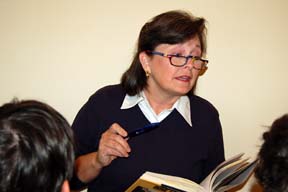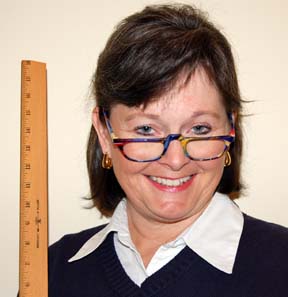

uring career day at school, what does your child say you do? Stay at home in jeans and play on the computer, or does she really know the tasks you sweat over? Or maybe she thinks the day job is your passion, when instead, you live to come home and get on that keyboard and write. Does she know enough to brag about your published work to playmates and friends? If you want to impress and make a splash with her, consider a position as a resident artist at your child's school…and receive pay to teach others about your love of writing.
Teachers in the public school system are drowning in administrative responsibilities. They serve as counselors, disciplinarians, nurses as well as teachers, with little time to delve into the heart of writing. Especially creative writing.
“…feedback demonstrates that kids
want to write well.”
FundsforWriters reaches 1600 youth with its Writing Kid newsletter, and the feedback demonstrates that kids want to write well. But they don't know how to start, most teachers do not have the time to teach it thoroughly, and parents don't know how, assuming their child confides in them at all about their secret passion.
A program that has proven itself many times over is Art in Education — AIE. Artist in Residence — AIR — is another way of describing a writer coming into the classroom and conveying writing skills to students. Every arts council and commission in the United States has some form of this program. And that means grants.
Arts commissions receive funds from national and state governments, with some donations from larger foundations. While some states will fund professional development, another won't. Some pay fellowships while others cannot afford them. However, all of them agree on this…students need to know how to write.
Arts commissions usually maintain a roster of artists, including writers, to fulfill these residency positions. Certification to be a resident artist varies from state to state. Some accept applications from artists only during certain months while others seek participants all year long. To connect with your state arts commission, go to www.nasaa-arts.org and find your state. If the web site doesn't answer all your questions, give them a call. Better yet, go see them. Take along your credentials. You don't have to be a New York Times Bestselling Author to fit the mold, but you do need to prove your talent and your publishing credits.

“If you write poetry or fiction, you have the ability to teach story writing, developing characters and describing setting and plot.”
Once you earn a place on the roster, you become available to schools and organizations throughout the state, with the arts commission offering a grant to the school to pay your way. Depending on your experience, you might teach second graders for a day or high schoolers for a week. A middle school may want you to assist students in the presentation of a play, resulting in weeks or months of work. The sky is the limit. And you define the horizon.
Look at your abilities. If you write poetry or fiction, you have the ability to teach story writing, developing characters and describing setting and plot. But you can also teach about literature in history, current great authors or even talented African American, Asian, female or Hispanic authors to coordinate with a larger school emphasis. A playwright can provide a marvelous parallel to a teacher's lesson plan, as can a nonfiction writer with expertise in computers, history, business or foreign languages. If you can write about it, you can teach about it.
“The key is to have the talent to teach
something outside the norm”.
The key is to have the talent to teach something outside the norm. How can you present a topic that a teacher can't or doesn't have the time to prepare for? This is where your creativity comes into play. Speak to your arts commission to determine the types of presentations that have been performed, and funded, in the past. If they give you a wide berth, then your next step is to visit your schools.
Connect with the educational systems in your town, your county, your state. Ask them what they'd like you to present. Be prepared to make some recommendations, but also be open to suggestion. Flexibility is key.

“…ask that teacher what she or he'd like to see happen in the classroom…”
Speak with your children's teachers, or the teachers of those you know. Use that connection to get your foot in the door. Over coffee, ask that teacher what she or he'd like to see happen in the classroom, and how you could fill that need. Discuss the year's syllabus and curriculum.
While you're preparing your application for your state's art commission roster, search locally as well. Many cities have similar programs. Your state arts commission knows where these smaller entities are located, because it helps fund them, possibly funding you in the process. You might be surprised at the number of them across your region! For example, Putnam County, NY has its own arts council (PAC) in little ole’ Mahopac, NY with a resident artist program. https://www.putnamartscouncil.com/
Kentucky Arts Council —
Arkansas Arts Council —
Nevada Arts Council —
- On the Nevada Arts Council website, they offer grant examples including AIE grants. This is a good educational tool to learn how resident artists work within a school program and what teachers have to do to justify a grant to pay the artist.
https://www.nevadaculture.org/
Oregon Arts Commission —
Wyoming Arts Council —
Utah Arts Council —
Arizona Commission on the Arts —
Missouri Arts Council —
South Carolina Arts Commission —
- On this page you find the links to the roster, the grant guidelines and even a conference where school representatives can witness the artists in action. The writers and artists perform in hopes of being selected for school programs.
https://www.southcarolinaarts.com/education/index.shtml
Washington State —
“…parents are voracious about finding unique educational opportunities for their students…”
- Get to know your arts council staff involved in the program to learn the best methods in getting accepted on the roster. They can also teach you how to be selected by a school.
- Learn the cycle of your state's roster program. Some allow new artists every two years, some annually, and others ongoing.
- Speak to your school principal about your desire to aid in the AIE program. Demonstrate your desire due to your own child being in the school, and how you want to show her and her peers how the arts are important.
- Speak to your child's teacher(s) and garner support and possibly a grant writer so that the school receives grant funds to pay your tab.
- Connect with the school PTO/PTA's. These parents are voracious about finding unique educational opportunities for their students, and they are all about aiding the teachers.

“You'll grow six inches taller right before her eyes.”
Imagine the light in your child's eyes when you spend a day or even a week tutoring her and her friends on the importance of creative writing, poetry or journalism. You'll not only be on the job but you'll also be bonding with your little one (or tall one, if she's a teen). You'll grow six inches taller right before her eyes.
Collect recommendations from the teachers you work with, and add them to your portfolio, web site and press package. Takes lots of pictures, including your child in the picture, of course.
If you want to add icing on the cake, write an article for the local paper about your experience and the need for arts in school curriculum. Offer photos to the paper to accent the piece and insure better placement. Make sure they are high resolution so you can plaster them on your web site.
Then, when that newspaper piece gets published, your child will be on clouds for a month. You'll be the best parent in the whole wide world, and will have earned a dollar or two as a writer in the process.
-------------
|